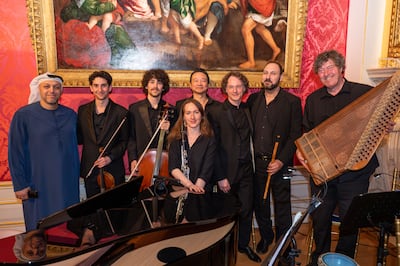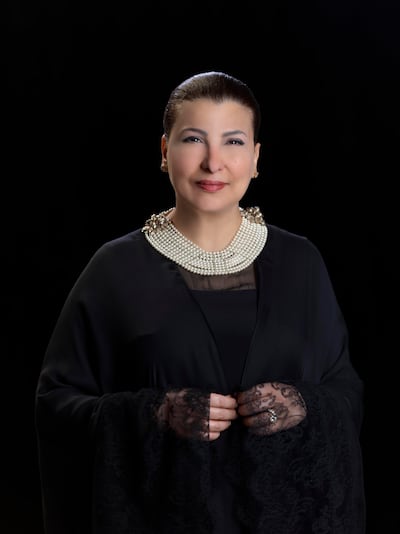Emirati musicians and composers took centre stage at a recital held at Kensington Palace in London. Organised by the Abu Dhabi Festival in partnership with UK non-profit the Peace and Prosperity Trust, the invitation-only performance on Friday was held in the presence of the Duke and Duchess of Gloucester.
The evening featured soprano Fatima Al Hashmi and baritone Ahmed Al Hosani, and marked the culmination of a three-week residency in London, where both artists trained under Welsh tenor Dennis O’Neill.
The London concert is part of the Abu Dhabi Festival’s continuing international programme, which this year included the March premiere of its co-commission of Claude Debussy’s Pelleas et Melisande at Paris Opera and a December concert by the UN Chamber Music Society at New York’s Carnegie Hall.
All these international initiatives serve a wider purpose, says Abu Dhabi Festival artistic director Huda Al Khamis Kanoo, from advancing the UAE’s cultural diplomacy to supporting Emiratis in the creative industries through talent development and technical training.
She describes the London performance as the first in an continuing partnership with the Peace and Prosperity Trust, a UK non-profit founded in 1995 that focuses on supporting cultural talent in the Middle East, and an example of how Emirati artists are appearing on international stages.
“What we are doing with these programmes is really more about what you are going to see in the future on stage, and that is more and more Emiratis performing in international spaces with world-class voices,” Alkhamis-Kanoo says. “And these will be powerful moments because we didn't exist on these international stages before and now we have the exceptional talent to do so. When they are listening to the music, they are hearing who we are as nation and what we represent.”

That principle guided Emirati composer Ihab Darwish in writing an evocative five minute piece Ruins of Time, which premiered at the Kensington Palace concert. Blending Arabic historical and contemporary melodies with elements of western classical music, the work was performed by an ensemble featuring strings, piano, qanun and the ney, a traditional Levantine reed flute.
As someone who composed similar momentous pieces, including the Abu Dhabi Festival commissioned Symphony of Three: Peace, Love, Tolerance in 2023 to celebrate the arrival of the Abrahamic Family House, he says the personal satisfaction of these compositions are unparalleled.
“The impact for me is deeper and not only in the way the music is received, but how I essentially view myself – and that's more as a cultural ambassador than a composer,” he says. “And as a musician from the UAE, we have so much inspiration to pull from, whether it's our own heritage or the fact we have more than 200 different nationalities who coexist together, that we have a responsibility to create music that at the very least provides an understanding of how we as people can understand each other more through peace and tolerance.”
Al Hashmi, whose repertoire included arias from Camille Saint-Saens’ Samson and Delilah and Mozart’s The Marriage of Figaro, says the London concert and residency programme pushed her creatively and offered valuable insight into the music industry.
“We’ve learnt about the different paths to becoming an opera singer, whether through full productions or recital work, because they require different approaches,” she says. “It’s been a wonderful three weeks of intensive vocal training with people from different cultures, backgrounds and experiences. We’ve learnt so much not just technically, but also about the structure of the music industry in the UK and Europe, and how it differs from the UAE and the wider Gulf region. We were introduced to the role of managers, how auditions are conducted, and how singers are selected for opera productions.”

Al Hosani, who delivered stirring renditions of Neapolitan songs by celebrated 20th-century Italian composer Ernesto De Curtis, describes the experience as akin to an opera boot camp.
“Each day was filled with learning, refining technique, interpreting music more deeply, and collaborating with incredibly talented artists and mentors,” he says.
“It pushed me out of my comfort zone and reminded me that excellence in this art form demands constant dedication and humility. I came out of the experience more confident and more connected to my purpose as a performer.”
That work, Al Hashmi says, is only half done. Trained academically as an architectural engineer, she views her pursuit of a career in opera not only as a personal calling but as a message to fellow Emiratis to follow their passions, and as a step towards helping build the UAE’s infrastructure for a performing arts industry. “I do see it as a huge responsibility,” she says, “not only to develop myself, but to contribute to the growth of the nation as a whole.”

Alkhamis-Kanoo echoes that sentiment, describing the concert as part of a broader professional and personal legacy-building effort.
“Whatever I built, I believe in giving opportunity. It’s an investment. And when you invest, you don’t just sprinkle funds and stop. It’s a legacy you are building for a lifetime,” she says. “If an Emirati is not on the stage, they could be backstage as a director, an engineer, a designer, or a sound technician. The talent and drive are there. We just have to keep opening doors and creating opportunities.








